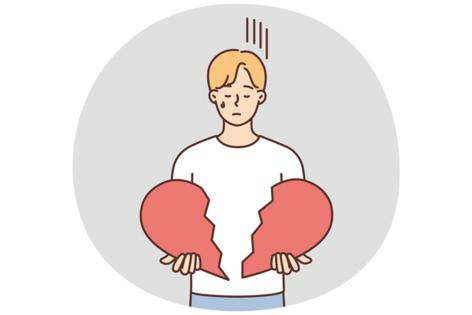The reason we can't move past the person we can't have
Published in Dating Advice
The story starts the same. You like someone. They like you. You continue liking this person. This person stops liking you (or never did?) and pulls back. You like this person more. This person, feeling smothered, continues to pull back. You continue to obsess more.
Why is this, though? Why should a person’s feelings actually grow the less and less someone is reciprocating those loving feelings. There are a few theories on this:
1. Over Investment
Elite Daily describes this theory. A principle on which our minds work is reciprocity. If we do something for someone, even if we haven’t asked for something in return, we still subconsciously expect someone to do something in return of about equal value. These things could range from dinner to a gift to something as simple as a text message. When the person of interest does not reciprocate, however, rather than withdrawing, we instead invest more in the hopes of the other person responding. And then once we’ve invested more, the amount of reciprocation required—in our minds anyway—increases.
Elite says, “Annoyingly, investing too much time and energy in someone without the person wanting it will usually push the person away. So, when you want someone who you simply cannot have, the best thing is to relax, step back and not invest so much into that someone (no matter how difficult that may be).” I agree.
2. Perceived Value & Scarcity
This is my theory. The less someone responds or reciprocates to one’s advances, the more “perceived value” the pursuer thinks this person has (“She must be so busy!” “He must be so overcome with options!” “She must have such a high-profile job that she doesn’t have time to reply to my text from six days ago… but who’s counting?”), so we try harder since this person must really be “worth it” if they are in such high demand, or a scarce resource.
And, sadly, the higher we perceive this other person’s value, the lower we often perceive our own. This person’s lack of response, though, should not imply a higher value. Rather, at its simplest, it should imply a lack of proper communication (“I’m simply not interested”) or just rudeness.
People think you’re better/smarter/more successful when you treat them worse. Let’s turn this concept on its head and instead recognize the people who reply, are kind and actually want to date you.
3. Defense Mechanisms
If there are 20 people you can “get” or “date” or whatever you want to call it, and there’s one person you can’t, some people will go for the unattainable because there will then be no accountability for a relationship not working. Let’s say you date someone who actually likes you, and after a number of months, the relationship fizzles. It’s no one’s fault, but you took an active role. If you chase the unattainable, though, you can never say that you took that active role. Rather, you never made it to the point of the relationship, and thereby never allowed yourself to succeed or fail.
4. Science
The brain’s “happy drug” is dopamine. For me, if someone scanned my brain, you’d likely find high levels of dopamine when 1) I walk into an H&M store (not ashamed), 2) someone surprises me with a piece of dark chocolate with sea salt, or 3) I get a hug from someone I like.
Our brain craves this feeling. So, by going for someone we know we can’t have—or we can only have sometimes—our brains love the unpredictability because the highs are higher than if we got the desired reward all the time.
This is why breadcrumbing, essentially stringing someone along, is so prevalent. Our brain says, “Yes! We want this!” With the extra dopamine, though, comes added anxiety. “When is he going to text?” “I haven’t heard from her in three days, and I know she’s back from her weekend trip by now.” “If he wants to go out this weekend, he needs to ask since it’s already Friday afternoon.” Is that a worthwhile tradeoff? I say no.
In all, it’s best to devote time and energy to what you do have and not what you don’t… or can’t. It’ll save time, energy and heartache in the end.
©2025 Tribune Content Agency, LLC















Comments